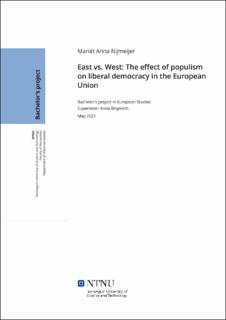East vs. West: The effect of populism on liberal democracy in the European Union
Bachelor thesis
Permanent lenke
https://hdl.handle.net/11250/2775743Utgivelsesdato
2021Metadata
Vis full innførselSamlinger
Sammendrag
Populistiske bevegelser har blitt et allestedsnærværende fenomen i Europa siden begynnelsen av det 21. århundre. Denne avhandlingen undersøker to populære populistiske ledere: Geert Wilders i Nederland og Viktor Orbán i Ungarn. I denne oppgaven utdyper jeg hvorfor begge politikere kan forstås som populister og undersøker hvordan begge utgjør en trussel mot det liberale demokratiet i Europa. Jeg utfører en komparativ casestudieanalyse av de politiske plattformene og retorikken til de to lederne. Ved å bruke det samme settet med kriterier på begge politikere, kan jeg undersøke om populisme fungerer på samme måte i Vest-Europa og Øst-Europa. Jeg sammenligner Wilders og Orbán basert på deres holdning til innvandring, EU og media. Avhandlingen viser at både Wilders og Orbán er sterke radikale høyrepopulister i Europa med et solid fremmedfiendtlig og nasjonalistisk syn på politikk. De karakteriserer mennesker som er imot dem eller er uenige i deres politikk som onde "fiender". Dette skaper et anspent forhold mellom populisme og liberalt demokrati. Derimot, utgjør de i ulik grad en trussel mot det liberale demokratiet. Forskjellene kan spores tilbake til deres politiske posisjon der Orbán, statsminister i Ungarn, utgjør regjeringen, og Wilders fungerer som en sterk partileder. Populist movements have become an ubiquitous phenomenon in Europe at the turn of the 21st century. This thesis examines two popular populist leaders: Geert Wilders in the Netherlands and Viktor Orbán in Hungary. In this thesis, I elaborate upon why both politicians can be understood as populists and examine how both pose a threat to liberal democracy in Europe. I perform comparative case study analysis of the political platforms and rhetoric of the two leaders. By applying the same the same set of criteria to both politicians, I am able to examine whether populism functions similarly in Western Europe and Eastern Europe. I compare Wilders and Orbán on their positions on immigration, the EU, and the media. I find that both Wilders and Orbán are powerful radical right-wing populists in Europe with a solidly xenophobic and nationalistic view on politics. They characterize people who oppose them or disagree with their policies as evil "enemies." This creates a tense relationship between populism and liberal democracy. However, to what degree they pose a threat to liberal democracy is different. The differences may be traced back to the divergence in their political position where Orbán, prime minister of Hungary, forms the government. Wilders, on the other hand, functions as a significant electoral force.
